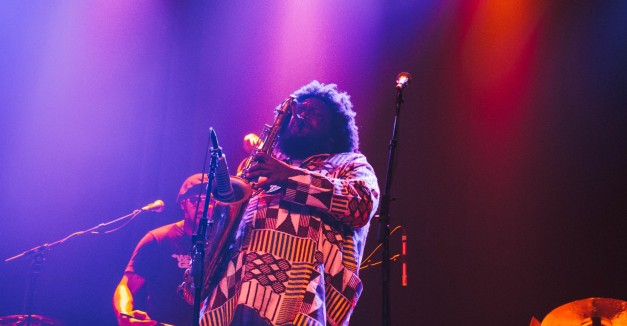Around 7:30, a line started forming outside Omaha’s Slowdown. A few were trendy twenty-somethings, who I spotted in the neighboring Urban Outfitters a half hour before. Aside from those in crisp chinos and Stussy streetwear were couples in evening dress, as if they came from an afternoon at the Jocelyn.
The epitomal aged jazz cat, goateed in a Kangol, was standing in queue with kid in a Brainfeeder tee.
Waiting in line for a jazz show.
“This is an exciting night for Omaha jazz” said Luke Polipnick before he, Dana Murray, and Mitch Towne — as the Delve Trio — launched into their opening set.
But this time, the jazz wasn’t blaring from dimly lit Lincoln blues bar or in a timid ballroom gala in Omaha, but in a theater, filled with a seated audience, ready and waiting.
Finally, Jazz was mainstage at the Slowdown.
The reason? The coming of Kamasi Washington, California-based saxophonist who leapt from the liner notes of Kendrick Lamar’s To Pimp A Butterfly and solidified himself as the new face of jazz in popular music with his three-disc opus, The Epic.
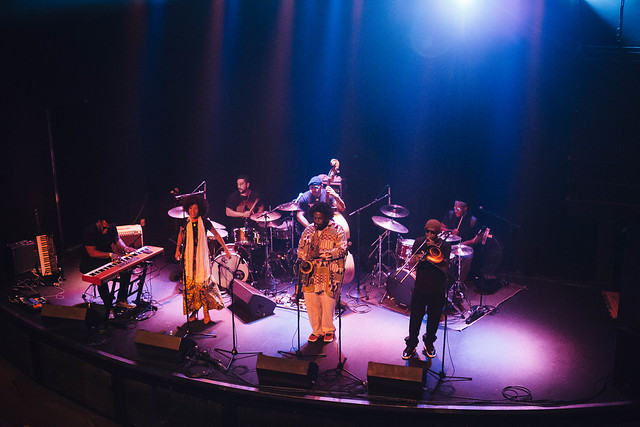
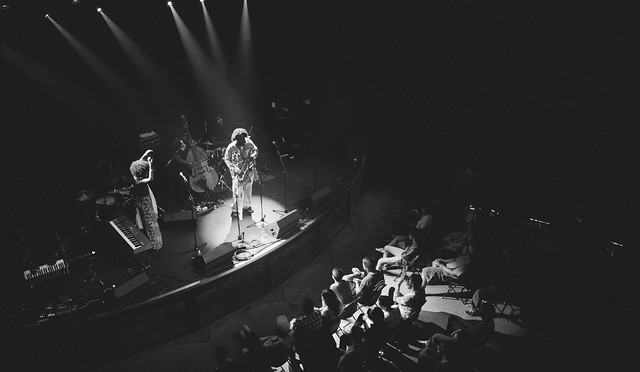
By now, Washington’s performances are of legend, just like his recent release. Reports of stages filled with 20-30-odd musicians and vocalists, four-hour marathon sets, and live, improvisation-laden renditions of his originals that even his magnificent recordings pale in comparison have left the staunchest of jazz music critics and hip young festival goers bewildered. Or so it has been said.
September 11th at the Slowdown was not May 4th at Los Angeles’ Regent, with the absence of the full choir, string section, and other members of the full ensemble including bass virtuoso Thundercat, but nothing about Friday’s performance was parred down.
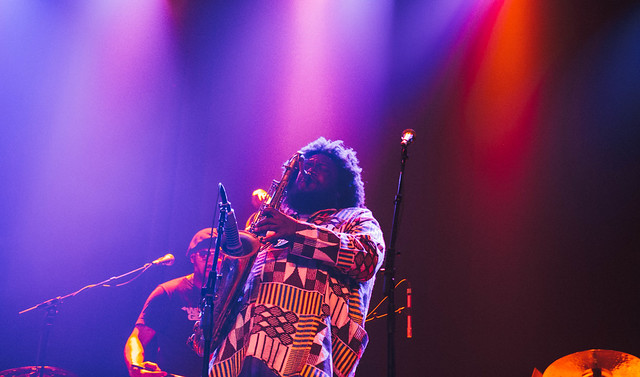
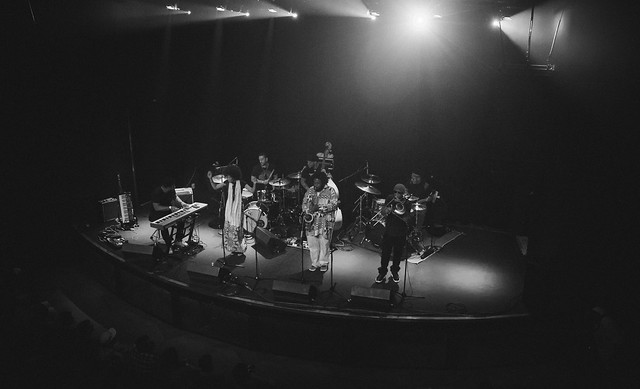
Washington, along with the Next Step, took to the stage with full power from the jump. With two furious drummers, Tony Austin and Ronald Bruner, Jr., a Brandon Coleman (aka “Mister Goodlove”) doubling synthesizer and keytar, a Miles Mosley on bass, vocalist Patrice Quinn, trombonist Ryan Porter, and with Washington on sax, the sextet maintained an intensity that lasted the entire night; even when one musician performed, that same energy from the opening big bang remained in the room, circulating from player to player, and to spectators alike.
As the Next Step came out swinging and left the room blinking with an almost strident rendition of “Re Run Home”, Quinn sang out, reaching to the audience, “When time has come / when work is done / when dreams come true / and the day is through…” sweetly beckoning all in attendance to leave the outside world behind, and to follow her into theirs, wild, strange, and awesome.
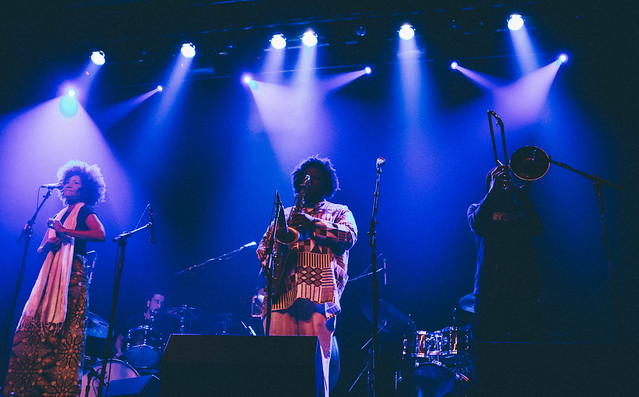
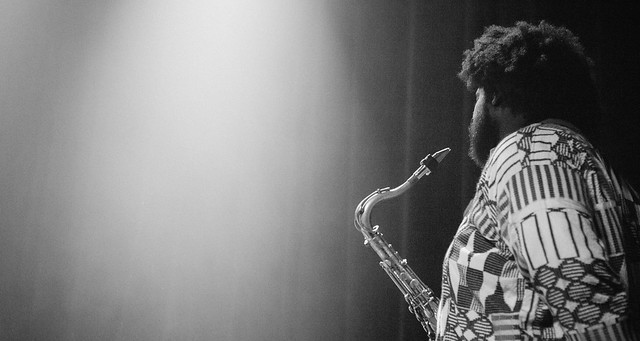
It was then Washington struck the five-piece ensemble into full swing. With his feet firmly rooted into the ground and eyes fused shut, Washington ripped into The Epic’s mighty theme, “Change of the Guard”. He gave such weight to every note, lagging even further behind the beat than on the recording with such swagger. It’s during these moments one forgets that this was the same man who only moments ago, in his trademark billowing dashiki and huge cloud of hair, floated onstage. Though he must be well over six feet, Washington walks small and lightly. Even his voice is sweet and even-keeled; every ounce of Washington’s power comes from his horn.
It was for this song Washington brought on childhood friend and “favorite alto saxophonist” Terrace Martin. It seems nothing short of divine that the very titans behind Kendrick Lamar’s To Pimp A Butterfly would touch down in Omaha no more than two days after Martin, a principal producer of that album, performed for the second time in two months with his father, the legend Curly Martin. Washington himself seemed excited to reunite with Martin to play a few songs he wrote with his friend in mind.
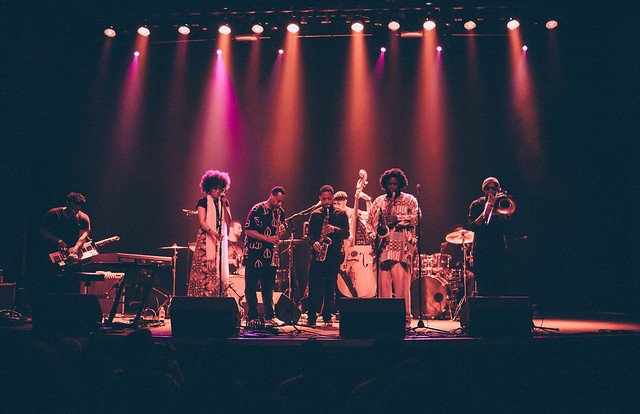
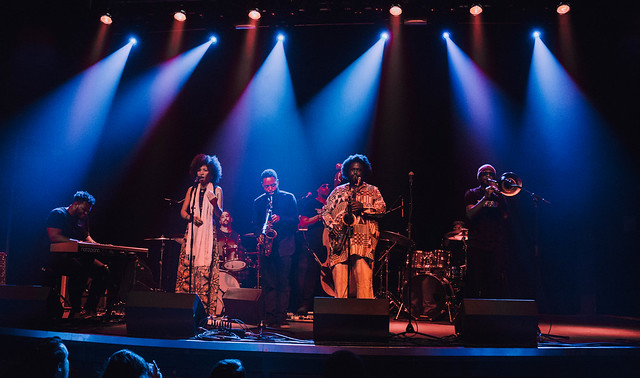
The West Coast Get Down, the community of California musicians, many of who constitute the Next Step, is a group of friends. Friday night at the Slowdown was very much a family affair. All on that stage have been playing together since they were kids.
It was Ronald Bruner, Jr. who as an infant in diapers, reportedly ruined Washington’s third birthday party as well as his aspirations of becoming a drumming prodigy by outplaying a toddling Washington before family and friends. A fine joke- one of many Washington shared between sets that night- but watching these men perform that night, it was hard not to imagine these men were complete players out the womb.
Friday night was a showcase of elite musicianship, and an invaluable clinic for any musician in the audience. Each performer (all of whom have their own solo projects coming out this year) got several moments to shine on their own and exercise their otherworldly talent.
Bruner Jr., arguably one of the greatest drummers of the day, shut the house down with the shared solo piece “Final Thought” with Tony Austin, juggling licks and trading blows from both ends of the stage. The drumming was pure circus, but also provided the massive foundation from which Washington & Co. rocketed into their own galaxies.
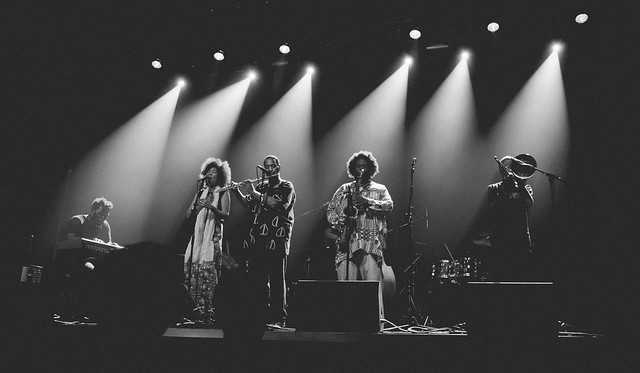
Bassist Miles Mosley teased alien sounds from his otherwise inconspicuous double bass with great style. Performing one of his originals Mosley traded basslines for lead voicings ranging from the textured and percussive to electric wails and moans like Hendrix in ‘69. He capped his tune quoting “Voodoo Child”.
The night had it sweeter moments as well, in trombonist Ryan Porter’s honey-sweet and smoky ode to his daughter, Washington’s goddaughter, “Aniah”, and in a new composition of Washington’s dedicated to his grandmother, Henrietta. The tune began as a light Motown shuffle, complete with plinking piano keys. It was small and humble, like his grandmother who stands a little over four feet tall, but blossomed into a grand, heroic climax. The song featured Washington’s father, Rickey Washington, who carried his solo through the close of the song, ending the tune called “Henrietta, our Hero” on a fittingly tender, heartfelt note.
The Next Step closed the night the best way possible, finding their own way to “The Rhythm Changes” with a deliciously long improvised transitional jam. Once Quinn began singing, the band was trotting along behind her, all players beaming (when they didn’t have their horns to their faces). Washington took the final solo, his longest and warmest yet, performing his sonic acrobatics for the Omaha crowd one last time.
It was Quinn’s words that capped the night with a sweet benediction of resilience: “The Time, the season, the weather/ The song, the music, the rhythm / It seems, not matter what happens / I’m here.” And just as she called us into the world of The Next Step, she asked us to cherish the last moments they were so kind to share with us.
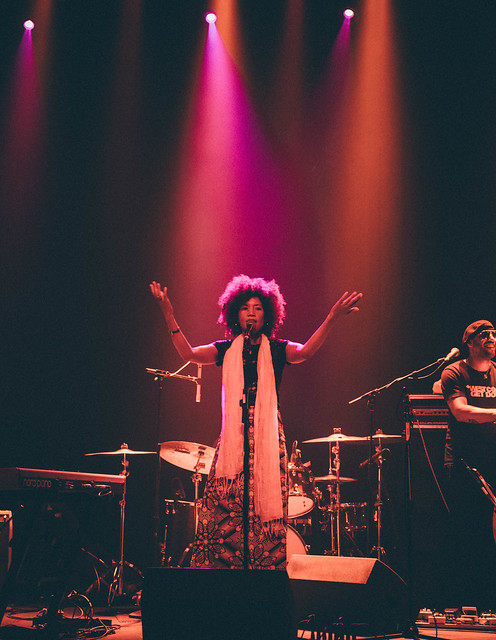
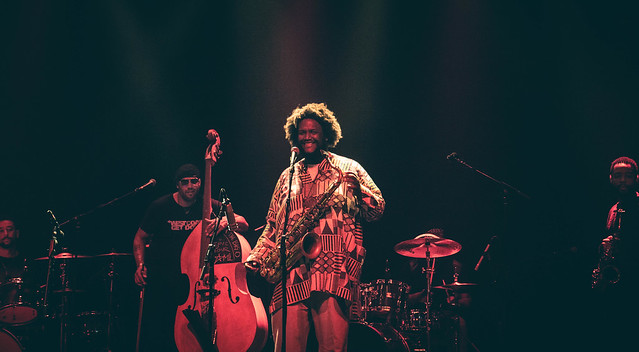
Nevermind that this may have been the first jazz show for many in attendance. It’s safe to say that Kamasi Washington and The Next Step were something else entirely. Washington’s prominence on Lamar’s TPAB and his resulting success is celebrated because he is a jazz musician. He’s been lauded as the genre’s savior, when it comes to popular music.
But that night, the critical role of Washington fell by the wayside. Not to say that The Next Step’s performance wasn’t jazz, because it sure as hell was, but the night was purely about musical expression. Walking out, it didn’t seem so novel that I was following a hipster wearing the shirt of an independent label and an older couple with salt-and-pepper hair.
Nevermind that we all came out to for a jazz show. We left a hell of a performance.




